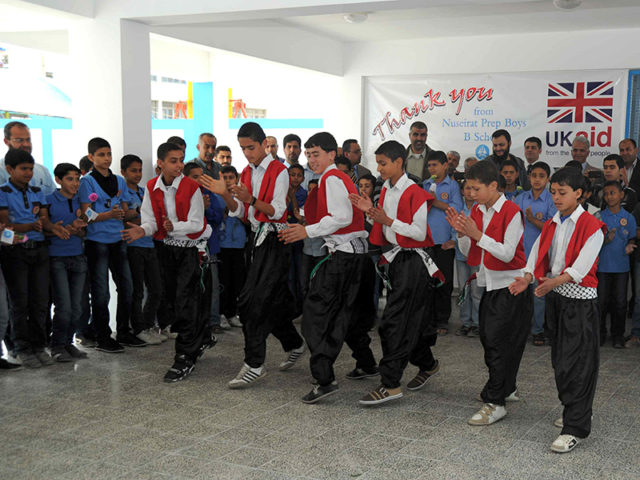Investigative journalist David Bedein has been following the monetary machinations of the United Nations Relief and Works Administration (UNRWA) since the late 1980s and one thing that has remained constant over that time is the involvement of Hamas in pretty much everything the UN agency does.
For years, Hamas has controlled the purse strings and syphoned off cash to promote its terrorist agenda. It operates a summer camp to indoctrinate young terrorists and boasts that the students it trains come from schools operated by UNRWA. It controls the employees union and teachers union in Gaza, ensuring its cadres benefit from the cash donated by governments from around the world – including Canada – that are supposed to go to easing the plight of Palestinian refugees.
Though he’s concerned that Canada recently renewed its allocation of $25 million to UNRWA for the second year in a row, Bedein believes this country’s involvement in UNRWA funding presents an opportunity for enhanced monitoring, to ensure the money goes for the purposes it was intended.
Right now, “there is no supervision whatsoever,” he said.
Bedein, who’s the director of the Israel Resource News Agency and the Center for Near East Policy Research, was in Ottawa on Sept. 25 to brief Liberal MP Michael Levitt on Hamas and its extensive ties to UNRWA, and to suggest that Canada could play a leading role in setting up a mechanism to closely scrutinize UNRWA’s use of its funds in Gaza.
Levitt chairs the Canada-Israel Interparliamentary Group and could help persuade other parliamentarians of the need for Canada to establish a formal mechanism to monitor spending by UNRWA in Gaza, Bedein said.
Armed with a recent report, titled UNRWA’s Problematic Educational Role in the Middle East Conflict, written by Arnon Groiss for the Center for Near East Policy Research, along with a short video, Bedein followed up his day-long visit to Ottawa with a trip to Washington, D.C., where he met with Congressman Doug Lamborn, who co-chairs the Israel Allies Caucus. From there, he went to the United Nations in New York, where he met with UN Secretary General Antonio Guterres’s staff to discuss the issue.
UNRWA, Bedein explained, paints itself as a humanitarian organization that’s doing good work, but it hides its ties to Hamas and that organization’s terrorist network.
“The people in PR for UNRWA paint themselves as Mother Theresa. They do a good job selling their product, like the cigarette industry,” he said, adding that donor nations are often taken in by the slick propaganda.
At one point, there was widespread acceptance of UNRWA’s claim that it was introducing a Holocaust curriculum in its schools. That never happened, Bedein said, but “very sophisticated guys in the Israeli administration fell for it, as did Jewish organizations.”
And according to Groiss’s report, “The books used in UNRWA’s schools in its various areas of operation often advocate an armed struggle against Israel, which is denied legitimacy as a sovereign state and severely demonized.”
Despite Bedein’s scepticism about UNRWA’s activities and the “war education” taught in the schools that the agency administers, he believes that under pressure and relentless scrutiny, it could be forced to spend its money in legitimate ways, as donor nations expect. UNRWA’s budget now totals US$1.2 billion ($1.49 billion).

In that context, Canada’s contribution is modest, but not long ago, it was zero. In 2010, the government of former prime minister Stephen Harper eliminated funding to UNRWA because of the links between the UN agency and Hamas.
The funding was restored by Prime Minister Justin Trudeau’s Liberal government, with the proviso that it be monitored rigorously.
When the funding renewal was announced in late August, Global Affairs Canada stated that, “Canada exercises enhanced due diligence on funding for UNRWA.
“This includes ongoing oversight, regular site visits, a systematic screening process and strong anti-terrorism provisions in funding agreements. Canadian officials on the ground in the West Bank and Gaza play a key role in ensuring ongoing oversight on programming.
“Canada and UNRWA have agreed to a Framework for Cooperation that outlines shared commitments and Canada’s expectations regarding the implementation of UNRWA’s reform initiatives, regular monitoring and reporting and compliance with Canadian anti-terrorism requirements.”
So far, Bedein said, there is no real mechanism in place to follow the money. And Jonathan Halevi, a former advisor in the policy planning section of the Israeli Ministry of Foreign Affairs, who accompanied Bedein in Ottawa, said Hamas and UNRWA are interlinked at many levels.
Canadian politicians are aware of these ties and that donated money goes to promote terrorism. But the Trudeau government has pledged to support UN programs and raise its foreign aid contributions. All this is designed to assist Canada, as it vies for support for its bid for a seat on the UN Security Council, Halevi suggested.









